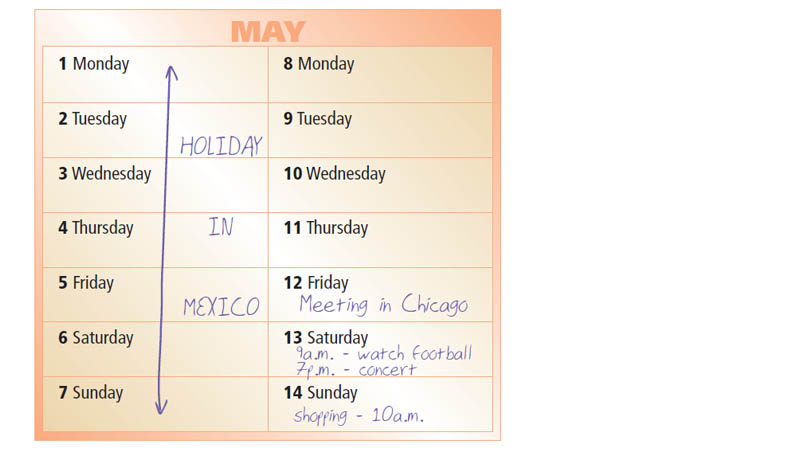Nesta aula do nosso curso online de inglês, você aprenderá a falar sobre eventos passados, usando expressões de tempo.
1 . Observe esta linha do tempo. Que expressões de tempo você utiliza para se referir a alguma coisa que aconteceu no passado?

Grammar: Time expressions
O adjetivo ago é usado com expressões de tempo para demonstrar quão longe no passado alguma coisa aconteceu.
I spoke to Harry a few minutes ago.
We were in Paris two days ago.
I saw that film ages ago!
Outras expressões de tempo úteis referem-se a momentos específicos do passado.
I phoned him last week.
We bought a new car yesterday.
2 . Você ouvirá uma pessoa relatando acontecimentos passados. Em seguida, complete o e-mail com as expressões de tempo do quadro.
last night | two weeks ago | last month | yesterday morning | this morning | last week | two days ago
Hi Jane,
I thought I would let you know what I’ve been doing. I went shopping (1) ……………………………… and spent a fortune! I also went on the internet (2) ……………………………… and spent even more! You know I’m mad about shopping.
What else have I been up to? Well, (3) ……………………… I saw a film called ‘A Dog’s Life’. It was terrible! Don’t see it, whatever you do! Also, I met Sylvia and Janice (4) ……………………… . Remember them? We all went out for a meal. Sylvia told us about a play she saw at the theatre. It was really boring and she hated it. (5) ……………………………… I played squash with Sylvia. (She won, of course!).
I almost forgot to tell you. (6) ……………………… Rob and I saw Manchester United beat Liverpool, three-nil. It was fantastic! And I went to London (7) ……………………… . I guess I have been really busy!!
3 . Leia a mensagem novamente. Anote duas expressões que revelam algo de que ela gostou e duas expressões que revelam algo de que ela não gostou.
Do you know?
● What have you been up to? Esta é uma maneira bastante informal de se perguntar alguém o que tem feito.
● I guess… Esta é uma expressão informal amplamente utilizada quando se quer oferecer uma opinião.
It’s getting late. I guess he’s not coming now.
4 . Observe a agenda de Mark de duas semanas. É domingo à tarde, 14 de maio. Complete as frases abaixo com expressões de tempo.

1 …………………………
Mark was on holiday in Mexico.
2 ……………………………
he had a meeting in Chicago.
3 ……………………………
he watched a football game on TV.
4 ………………………………
he went to a concert.
5 ………………………………
he went shopping.
20 minutes+
Complete o questionário de pesquisa de mercado usando expressões de tempo desta lição e suas próprias palavras.
WLH Market Research
Westlake Leisure Holdings plc want to know how people in the town spend their leisure time and would be grateful for your help. Please spare a few moments of your time to complete this questionnaire.
When was the last time you:
Had a holiday? ……………………………………………………
Went shopping? …………………………………………………
Used the internet? ………………………………………………
Went to the cinema? ……………………………………………
Went to the theatre? ……………………………………………
Went to a gallery? ……………………………………………….
Saw a sporting event? …………………………………………..
Watched television? ……………………………………………..
Ate in a restaurant or café? ………………………………………
Thank you!
Word Bank
diary (substantivo) = agenda
fortune (substantivo) = fortuna
grateful (adjetivo) = grato
leisure (substantivo) = lazer, tempo livre
mad (adjetivo) = enlouquecido
squash (substantivo) = squash (esporte)
Resposta:
Exercício 2
1 two days ago
2 yesterday morning
3 last week
4 last night
5 this morning
6 Last month
7 two weeks ago
Exercício 3
like: I’m mad about shopping, It was fantastic
dislike: It was terrible, She hated it
Exercício 4
1 Last week
2 Two days ago
3 Yesterday morning
4 Last night
5 This morning
20 minutes+
Model answers:
I had a holiday last year.
I went shopping yesterday morning.
I used the internet a few minutes ago.
I went to the cinema last week.
I went to the theatre three weeks ago.
I went to a gallery last month.
I saw a sporting event two days ago.
I watched television last night.
I ate in a café this morning.
 Sair da aula
Sair da aula